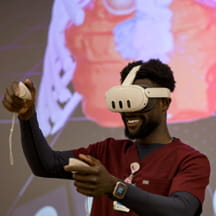Walking through the halls with claws painted purple by a patient is the newest resident dog, Odessa, at Children's Health of Orange County's hospital campus in Orange, California. One of the first resident dogs in the nation dedicated to a pediatric inpatient mental health unit, Odessa's arrival to the Cherese Mari Laulhere Mental Health Inpatient Center comes at a critical time.
Since March 2020, the number of patients in the unit, designed to stabilize patients in a crisis, has been higher than ever, says Dani Milliken, director of the unit.
Additionally, the average length of stay for patients in the unit has seen a consistent increase, Milliken says. This is attributed to an increase in acuity for patients, as well as complex psychosocial dynamics that might prolong admission. While a typical stay may be three to five days, some months saw an average stay of 10 days for some patients.
"This indicates that children are coming into the unit much sicker than before, and it's taking the team longer to stabilize them," Milliken says.
Growing the unit's toolkit
A black Labrador and golden retriever mix, Odessa's presence provides an additional resource to the unit's staff as they work to treat patients as young as 3 years old who are experiencing mental health crises.
"Already, our unit is such a contrast from many misconceptions of an inpatient mental health facility: It's filled with light, music and laughter," Milliken says. "On top of that, Odessa brings an additional element of love and support."
While a visit from a dog might cheer anyone, Odessa's work is specific and targeted to help patients meet goals. The team has devised a "ruff-eral" system for Odessa, considering patients' varying needs, says Janessa Vanden Berge, a child life specialist and Odessa's handler.
Odessa's priority are patients who are struggling to cope or experiencing distress. These might be patients who have never been in a hospital or, more infrequently, a patient who might be in physical pain. The second priority are patients who need support building rapport and trust with staff.

Odessa has specific tasks, such as helping a patient paint, that support the patient's clinical goals. Photo: Children's Health of Orange County.
"She is offering unconditional love and support," Vanden Berge says. "We are building that trust back up. Sometimes kids don't want to talk to grown-ups but will open up and start sharing with her. It instantly shifts their mode."
Odessa might also support patients who need help with daily activities such as taking a shower, brushing their hair or brushing their teeth.
Odessa and Vanden Berge focus on providing trauma-informed care. With its five principles of safety, choice, collaboration, trustworthiness and empowerment, trauma-informed care focuses on the complex effect of trauma and how it shapes a person's efforts to cope. This shifts the conversation from "what's wrong with you" to "what happened to you."
"We help patients process feelings, experiences and provide hope for the future," Vanden Berge says. "This combines my skills as a child life specialist with Odessa's skills as a resident dog to meet kids where they are and to be on this journey alongside them."
A growing pack
Including resident dogs in the range of therapeutic services is a trend in children's hospitals, and resident dogs have specific tasks that support clinical goals. Across children's hospitals, full-time handlers are often social workers, chaplains, physicians and child life specialists.
"Odessa loves to lay outside in the sunshine," Vanden Berge says. "That's her all-time favorite thing."

Odessa and Lois make up the resident dog team at CHOC. Photo: Children's Health of Orange County.
Odessa isn't the only four-legged friend at CHOC. In addition to a pet therapy program supported by volunteers, Odessa joins Lois, CHOC's first resident therapy dog who works in the main patient care towers to help patients meet specific clinical goals.
Lois joined the health system in October 2021. She and her handler, Chloe Krikac, also a child life specialist, work together to normalize a child's hospital experience by making the environment feel more like home; motivate patients by making goals like taking a walk or medicine more fun; offer a distraction during a procedure or painful moment; and, of course, offer unconditional love and acceptance.
"There isn't anything better than seeing a child connect with Lois while also reaching a new clinical milestone, finding comfort and peace, or even just smiling after a tough day," says Krikac.
In addition to patients, the two dogs have brought cheer to staff—an especially welcomed distraction during the pandemic.
Both dogs made their debuts at the hospital during special "Dogs and Donuts" events, where staff could meet Odessa and Lois in a socially distanced environment and grab a donut. Staff working remotely and in other CHOC locations were able to participate virtually.



